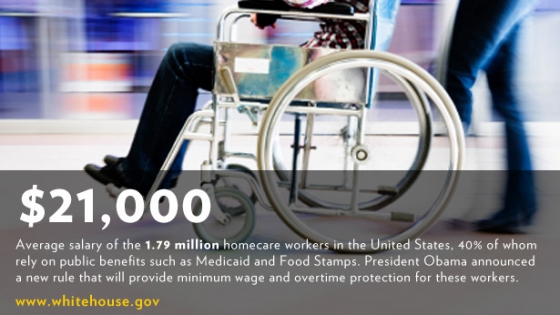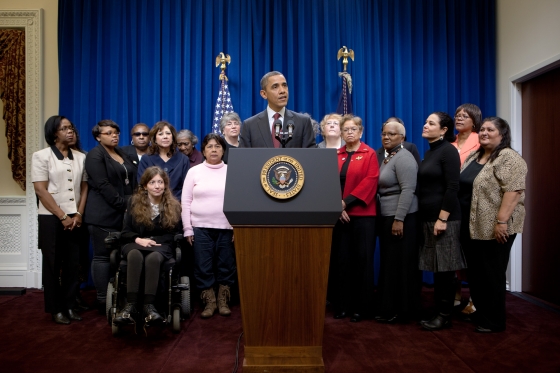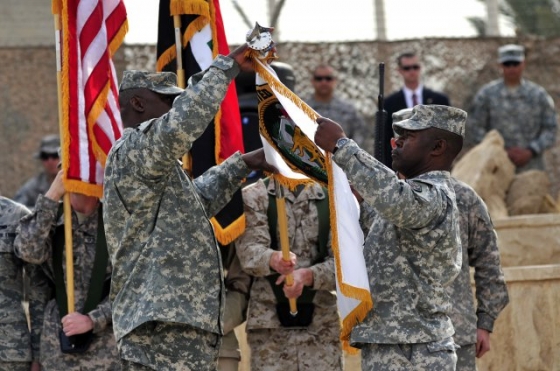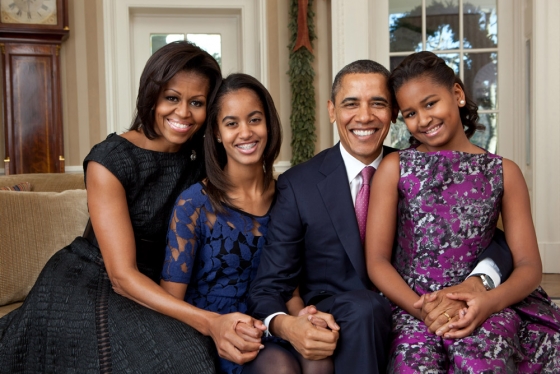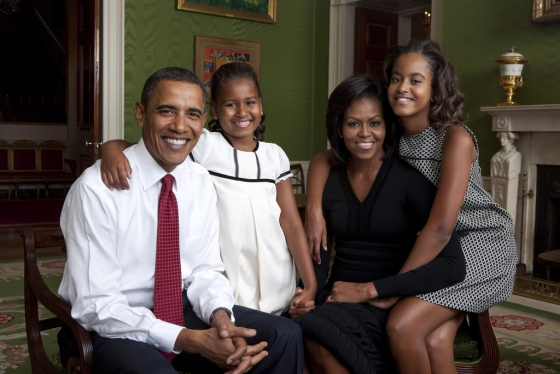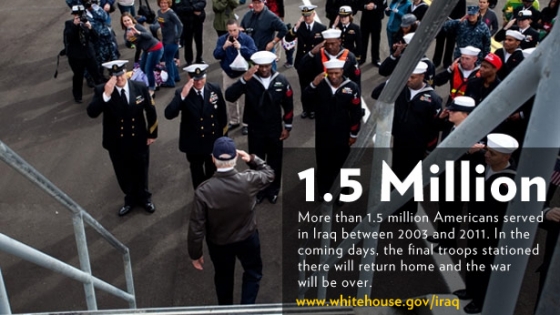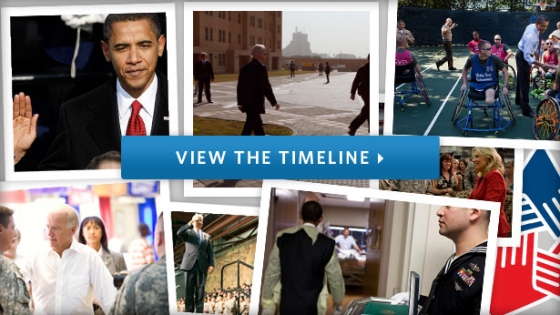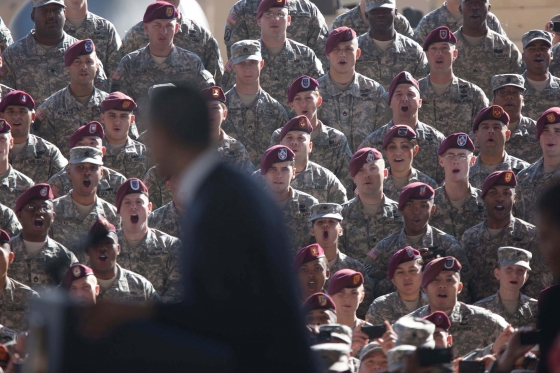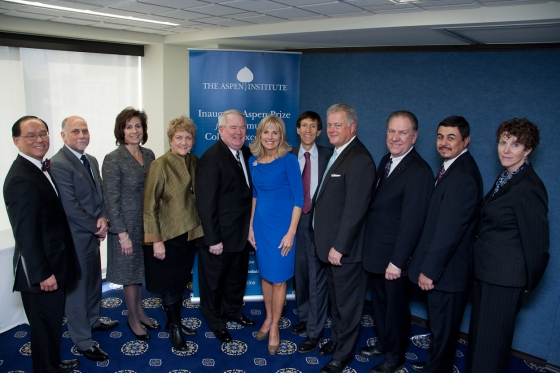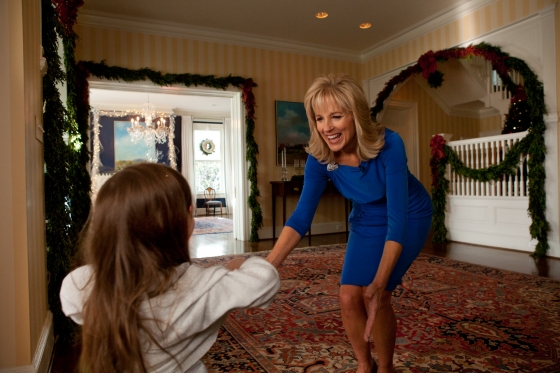-
Today President Obama announced a proposal that would ensure fair pay for the 1.79 million workers who provide critical in-home care services for the elderly and infirm. Because of the way the Fair Labor Standards Act is written, these workers are classified as “companions” and therefore exempt from minimum wage and overtime requirements, despite the fact many of them work up to 70 hours a week. The average salary for full-time, in-home care workers is just $21,000 a year.
When the exemption was established in 1974, it was meant to apply to casual babysitters and companions, not workers whose vocation was in-home care service. Now, as our population ages, the need for professional in-home care services is greater than ever. These workers should be paid fairly for their hard work and long hours and today’s proposed legislation changes would ensure that they are.
Approximately 92 percent of these workers are women, and a large number of them are their family’s breadwinners. Close to 40 percent rely on public benefits such as Medicaid and food stamps to make ends meet. Today’s proposed rule would expand minimum wage and overtime protections by ensuring that all home care workers employed by third parties, like staffing agencies, will receive protections along with workers who are privately employed.
For more information:
- Learn the story of Pauline Beck, a home care worker then-Senator Obama spent a day working alongside when he was a candidate for this office. Beck was at the White House today when President Obama announced the new proposal, fulfilling a promise he made to her and other home care workers back in 2007.
-
Four years ago, President Obama spent the day with Pauline Beck, a home health care worker. He followed her throughout her day -- as she got up at 5:00 in the morning to care for an 86-year-old amputee. He saw first-hand the demands of her work.
Their business is a growing industry -- one of the fastest in America. As the population of this country gets older, more Americans are turning to people like Pauline Beck to help make sure they have the care they need. And as the President said this morning, "As the homecare business has changed over the years, the law hasn’t changed to keep up." In the eyes of the law, homecare workers fall into the same category as a teenaged babysitter.
So today, the President did something to help homecare workers like Pauline Beck. He announced his support of a law to extend overtime pay protections and a guaranteed minimum wage to those who do this work:
We are going to make sure that over a million men and women in one of the fastest-growing professions in the country don’t slip through the cracks. We’re going to make sure that companies who do right by their workers aren’t undercut by companies who don’t. We’re going to do what’s fair, and we’re going to do what’s right.
Watch.
-
Yesterday, we received two more pieces of good news about our work to bring down the cost of health care. Thanks to the Affordable Care Act and the Obama Administration’s work to fight fraud, we’re delivering real savings for businesses and families and fighting criminals who steal from the health care system. We are also making it easier for small businesses to insure their workers.
Record High Number of Health Care Fraud Prosecutions
The Obama Administration is committed to fighting health care fraud and a new independent report shows just how serious we are about cracking down on criminals. The independent Syracuse University Transactional Records Access Clearinghouse examined data from the Justice Department and reported:
“Federal health care fraud prosecutions reached an historic high last year. During the twelve months of fiscal year 2011, the government reported 1,235 new health care fraud prosecutions -- the largest number reported since separate tracking of this offense began twenty years ago. This number is up 68.9% over the past fiscal year when the number of criminal prosecutions totaled 731.”
Health care fraud is a crime and when fraudsters steal from the health care system, we all pay the price in the form of higher health care costs. This news builds on the Vice President’s announcement earlier this week on a new Medicare initiative to crack down on fraudulent prescriptions for drugs like OxyContin. And the record number of prosecutions is yet another sign that President Obama’s team is serious about fighting fraud and it sends a strong message to anyone who would think about committing these crimes.
Relief for Families and Small Businesses
Our second piece of good news came when we learned that Highmark Blue Cross Blue Shield will provide more than 4,200 small businesses in West Virginia with rebates worth an average of $2,500 per business.
Highmark is providing the rebates because of a new rule in the Affordable Care Act. Under the law, if insurance companies don’t spend at least 80 percent of your premium dollar on medical care and quality rather than advertising, overhead and bonuses for executives, they have to provide you a rebate for those excessive profits.
When Highmark determined they wouldn’t meet the standard, they cut their premiums, giving consumers some welcome health care cost relief. We expect more consumers across the country to benefit from this provision of the law in the weeks and months ahead.
The Bottom Line
President Obama is committed to controlling health care costs and the latest news shows his work is making a difference.
Nancy-Ann DeParle is the Assistant to the President and Deputy Chief of Staff
-
Defense Secretary Leon Panetta and Army Gen. Martin E. Dempsey -- chairman of the Joint Chiefs of Staff -- were in Baghdad today to bring the mission in Iraq to its official end.
At Baghdad Airport, in a ceremony steeped in tradition and history, soldiers lowered and cased the U.S. flag in preparating for its return to the United States.
"This will be an historic moment where we basically enter a new chapter in Iraq in which we deal with them in a way that represents the kind of normal relationship we have with other countries," Secretary Panetta said.
The drawdown will continue through December 31.
-
December 15, 2011
12:23 PM EDTHave you noticed some new tweets from the @WhiteHouse handle? Or, some different posts on the White House Facebook page? That’s because we’ve called on the current class of White House interns to give you a unique look at the White House intern experience, in 140 characters or less. Here are a some examples:
-
The White House photo office today released a new official portrait of the First Family, which was taken by Pete Souza in the Oval Office on Sunday December 11, 2011 after the family returned to the White House after church services. The previous official portrait, below, was taken in the Green Room in 2009 by Annie Leibovitz.
-
Ed. note: This is cross-posted from Work in Progress, the Official Blog of the Department of Labor
In-home care service is a high growth industry, and it’s projected to grow by 50 percent between 2008 and 2018. In-home caregivers are an essential component of the health care system and will only become more important, as an increased number of patients turn to them for more affordable assistance with medical care as well as everyday tasks and household chores.
Many homecare providers earn less than the minimum wage and no overtime for these vital services. In 2007, then-Senator Obama spent a day with professional homecare worker Pauline Beck, assisting with her daily tasks and observing firsthand the unique challenges of in-home care (watch the video). He was impressed by Pauline’s dedication, and determined to assist her and others in her profession.
Today, Pauline joined me and President Obama as he announced a proposal from the U.S. Department of Labor to revise the Fair Labor Standards Act rules that would ensure fair pay for approximately 1.8 million workers who provide in-home care services for the elderly and infirm. This new rule would ensure that these hardworking professionals who provide valuable services to American families would receive the protections of minimum wage and overtime pay that nearly every employee in the United States already receives under the FLSA.
Many of these workers are the primary breadwinners for their families. Of the roughly 2 million workers who will be affected by this rule, more than 92 percent are women, nearly 50 percent are minorities, and nearly 40 percent rely on public benefits such as Medicaid and food stamps. According to the Bureau of Labor Statistics, home health care aides earn about $21,000 a year and many lack health insurance. That is unacceptable.
The proposed regulation would also ensure that employers who have been treating these workers fairly are no longer at a competitive disadvantage. Leveling the playing field for both workers and employers is a fundamental principle of the FLSA.
-
Today Pauline Beck will be at the White House to watch as President Obama announces proposed changes to the Fair Labor Standards Act (FLSA) that will affect home healthcare workers like herself. Today's event has special significance for Pauline, because it was the day then-Senator Obama spent "in her shoes" that informed him of the important work these Americans do and the need to level the playing field so they are fairly compensated for their efforts. Take a minute to watch the video and learn her story.
-
More than 1.5 million Americans have served in Iraq between 2003 and 2011. More than 30,000 troops were wounded in the fighting, and 4,500 lost their lives. As the war draws to a close in the coming days, we thank every one of them for their service, their sacrifice, and everything they've done to help end the war.
Today at Fort Bragg, President Obama said that these numbers don’t come close to telling the full story of the Iraq war.
Our civilians have represented our country with skill and bravery. Our troops have served tour after tour of duty, with precious little dwell time in between. Our Guard and Reserve units stepped up with unprecedented service. You’ve endured dangerous foot patrols and you’ve endured the pain of seeing your friends and comrades fall. You’ve had to be more than soldiers, sailors, airmen, Marines and Coast Guardsmen –- you’ve also had to be diplomats and development workers and trainers and peacemakers. Through all this, you have shown why the United States military is the finest fighting force in the history of the world.
The President has pledged to stand by the service members that have fought so hard once they come home, and will make sure they get all the care and benefits they’ve earned.
After years of rebuilding in Iraq, we want to enlist our veterans in the work of rebuilding America, President Obama said today, which is why we’ve committed to doing everything we can to extend opportunities to those who have served. This commitment includes the Post-9/11 GI Bill that will help service members and their families get a college education. It includes launching a nationwide effort to connect veterans with companies that want to hire them, and offering tax credits as incentives for businesses to make those hires.
Take a minute to write a note that troops all over the world will see. Thank them for their service and sacrifice, and let them know as they return home that you’ll stand by them, too.
-
On August 31, 2010, President Obama addressed the nation from the Oval Office to announce the end of combat operations in Iraq.
Now, after nearly nine years of sacrifice, the final troops stationed in Iraq will cross the border out of the country in the coming days—marking the end of the war and fulfilling the promise President Obama made to the American people when he was a candidate for this office.
To see more milestones from the Iraq War, from President Obama’s very first day in office through the work his Administration has done to support our troops as they return home, check out our new timeline.
-
President Obama traveled to Fort Bragg, North Carolina on Wednesday -- home of the Airborne and Special Operations Forces -- to salute the service of the soldiers, sailors, airmen, Coast Guardsmen, and Marines who fought in Iraq and helped to bring the war to an end.
"As your commander in chief, and on behalf of a grateful nation, I’m proud to finally say these two words," he said, "Welcome home."
-
Historically, young adults making the transition from school to work have been substantially more likely than any other demographic group to go without health insurance. In today’s labor market, it can be particularly tough for young workers to find jobs that provide health benefits.
A new policy enacted as part of the Affordable Care Act is designed to make it easier for younger Americans to obtain and maintain health insurance. The policy, which took effect in 2010, allows young adults to stay on their parents’ health insurance plan up until they turn age 26. Prior to the Act, dependent children were typically dropped from their parents’ coverage when they turned 18 or graduated from college.
 Today, the CDC released new data that indicate that this provision of the law is already making a difference. New results from the National Health Interview Survey show that, from September 2010, when this part of the law took effect, to June 2011, the percentage of 19 to 25 year olds with health insurance coverage increased by more than 8 percentage points, from 64.4 percent to 72.7 percent. This translates to roughly 2.5 million young adults gaining coverage.
Today, the CDC released new data that indicate that this provision of the law is already making a difference. New results from the National Health Interview Survey show that, from September 2010, when this part of the law took effect, to June 2011, the percentage of 19 to 25 year olds with health insurance coverage increased by more than 8 percentage points, from 64.4 percent to 72.7 percent. This translates to roughly 2.5 million young adults gaining coverage.A closer look at the NHIS data makes it clear that the Affordable Care Act is responsible for this good news. First, the coverage gains were accounted for entirely by an increase in private insurance coverage. There has been no statistically significant change in the percentage of 19 to 25 year olds covered by public health insurance since September 2010. Second, as shown in the graph, the percent of young adults between the ages of 26 and 35 with health insurance coverage stayed roughly constant over the same time period. This slightly older cohort can be seen as a plausible “control group” because its members faced similar economic conditions as 19 to 25 year olds but are generally not eligible for dependent coverage through their parents’ insurance.
-
As President Obama has said, “our Nation's doers, makers, and entrepreneurs have proven time and again that, in America, it takes only a single good idea and the courage to pursue it to change history.”
Women-owned businesses are one of the fastest growing segments of the small business community, but women continue to face challenges, including access to capital and lack of opportunities to grow.
Ask questions and learn more about the federal government’s policies and programs that are designed to help women entrepreneurs at our upcoming “Open for Questions,” session with Christine Koronides of the National Economic Council, and the U.S. Small Business Administration’s Associate Administrator for Small Business, Ana Harvey.
- What: Open for Questions: Women’s Entrepreneurship
- Who: Christine Koronides, White House National Economic Council, and SBA’s Associate Administrator for Women’s Business Ownership, Ana Harvey
- When: Tuesday, December 20, at 3 p.m. EST
- Where: Watch live at WhiteHouse.gov/live and submit your questions via Facebook, Twitter using the hashtag #WHChat or our webform.
Hallie Schneir is Associate Director of the Office of Public Engagement
-
Community colleges play a critical role in preparing the American workforce for prosperity in the economy of the 21st century. Americans now more than ever need a postsecondary education to learn the skills they need to be successful in the workplace and to keep our businesses thriving in a globally competitive environment.
Community colleges are educating the next generation of American workers and leaders by providing more Americans than ever with training for success in a knowledge based economy. Our best community colleges are on the cutting edge of innovation, showing us what can happen when a college reaches beyond its campus to partner with businesses and four-year colleges in order to expand opportunity, provide intensive preparation for career, and ensure excellence leading up to graduation and into the workforce. As the unsung heroes of higher education, these schools are shining examples of what can happen when institutions work hard to improve student learning and increase degree completion.
We acknowledge the important work of our best community colleges in developing our citizens, our economy, and our nation. At the National Press Club on Monday, Second Lady Dr. Jill Biden and Secretary of Education Arne Duncan took time to salute to the finalists and winner of the inaugural Aspen Prize for Community College Excellence. In these community colleges, our Administration has a strong partner in endeavoring toward the President’s 2020 goal to again lead the world in college completion.
The first-ever winner of the Aspen Prize is Valencia Community College from Orlando, FL. Demonstrating a strong commitment to completion, Valencia offers clear pathways to student success, from associate’s degree programs with guaranteed admission to the selective University of Central Florida to technical degree programs that have career advisers embedded in each program. The environment at Valencia is marked by professors and administrators taking responsibility for student success, consistently asking what they each can do to improve student outcomes. And with a strong data system in place, the graduation and workforce results are clear. These outcomes are important to Valencia’s diverse student body (about half are Hispanic or African American), a significant number of whom come from lower-income households.
-
As a parent, nothing gives us more peace of mind than knowing that our children can pursue their dreams without unfair limitations. This is why I’m excited to announce that millions more young adults in America now have health insurance coverage thanks to the health care law – enabling them to pursue their goals without worrying about what will happen if they get sick.
The provision in the law allowing young adults to remain on their parents’ health insurance until age 26 has resulted in 2.5 million young people gaining coverage, according to analysis based on new data released today by the National Center for Health Statistics.
Families around the country are benefitting from this part of the law, including families like the Houghs, whose daughter Natalie was diagnosed with a rare heart condition after suffering a cardiac arrest at school. Her condition requires a lifetime of medication and care. There was a day when this diagnosis would mean insurance companies would either not cover Natalie or would offer her unaffordable plans. It would mean that Natalie and her family would have to keep paying, or face the unimaginable alternative.
Now, thanks to the health care law, Natalie can stay on her family’s plan and has started college. And, by the time she turns 26, it will be illegal for a plan to deny coverage to anyone, regardless of their health and Natalie will have access to quality, affordable care.
Today’s news is more evidence of the good things the health care law is doing for young people and their families. More young adults in this country can now go on and live their lives with less worry about visiting their doctor when they get sick, or incurring catastrophic medical bills if they are in an accident. And for us parents, this lets us breathe a sigh of relief.
Kathleen Sebelius is the Secretary of Health and Human Services
-
In this new White House White Board, Brian Deese, the Deputy Director of the National Economic Council, explains how President Obama's payroll tax cut helps families, businesses, and the economy -- and why it's so important to extend that tax cut for 2012.
-
I’ve met with researchers, entrepreneurs and students across the country and I can say without hesitation that the United States is the world’s most innovative country. At those same meetings, I’ve also learned firsthand about obstacles that clean energy entrepreneurs face.
To compete in the global economy, we need to unleash the creativity and ingenuity of our citizens in high-growth markets like clean energy. We also need to remove unnecessary barriers to startups – to increase the chances for a clean energy entrepreneur to be successful in starting and scaling a high-growth business.
Trillions of dollars will be invested in clean energy over the coming decades. Countries around the world recognize this enormous economic opportunity and are racing to get ahead. Our country faces a simple choice: we can develop and produce clean energy technologies today or we can import them tomorrow.
-

December 13, 2011
05:50 PM EDTThe mood was merry when Dr. Jill Biden hosted a fourth-grade class from White Oaks Elementary School in Burke, Virginia at the Vice President’s Residence on Monday, Dec. 12. The festive event focused on helping children understand the challenges faced by military families during the holiday season.
Dr. Biden talked to students about the importance of supporting classmates whose parents are serving in the military, particularly around the holidays. After describing her own experience as a military mom when her son, Army Major Beau Biden of the Delaware National Guard, was deployed in Iraq for a year, Dr. Biden introduced Army Colonel Rebecca Porter, who talked about the impact deployment has on military families.
The students then moved to the library where they heard from Major James Blain – the father of classmate Jimmy Blain – who is currently deployed in Afghanistan. Working with a program called United Through Reading, Major Blain read Mickey’s Christmas Carol to the class, via a pre-recorded DVD. Major Blain’s wife, Tina, brought their other three children – Josephine, Anna Mae and Matthew – to the event. Mrs Blaine said the recordings created through United Through Reading were an important way for families to stay in touch during deployments. When Major Blain appeared on screen, Matthew immediately called out, “Daddy! Daddy!”
As part of its support for First Lady Michelle Obama and Dr. Biden’s Joining Forces Initiative, United Through Reading last week announced a pledge to double its commitment to U.S. Army and National Guard families in the next two years.
After the story, students made cards for military service members and enjoyed a surprise visit from Santa.
-
As part of the Obama Administration’s Campaign to Cut Waste, Vice President Biden today announced the U.S. Mint would suspend the production of Presidential dollar coins for circulation. Today, nearly 1.4 billion surplus dollar coins are sitting in Federal Reserve vaults due to lack of demand for the coins.
No longer making $1 coins for circulation will save taxpayers at least $50 million per year in production and storage costs. Rather than producing the 1.6 billion additional dollar coins it was on pace to produce through 2016, the Mint will only make enough coins to sell to the collectors who want them. The existing inventory of coins will be used to meet regular circulating demand, and will be drawn down over time.
Today’s announcement took place at a Cabinet meeting about the President’s commitment to cut waste and eliminate misspent dollars across the Federal Government. At the meeting, Vice President Biden also announced that the Department of Justice had recovered more than $5.6 billion in fraud across the government in 2011, as well as steps the Department of Health and Human Services is taking to prevent Medicare prescription drug fraud.
-
What's the difference between these two school lunches?
Lunch 1
Lunch 2
Cheese pizza
Whole wheat cheese pizza
Canned pineapple
Sweet potato fries
Tater-tots
Raw grape tomatoes
Low-fat chocolate milk
Applesauce
Low-fat milk
If you guessed that Lunch 2 is a whole lot healthier for kids, you’re exactly right. Lunch 1 is a typical meal served in a school cafeteria that doesn’t follow the guidelines for nutritious, balanced meals established by the Healthy, Hunger-Free Kids Act. The legislation, signed into law by President Obama on December 13, 2010, directs schools to serve healthier, more wholesome food, like those on the menu for Lunch 2.
The Healthy, Hunger Free Kids Act is an important step toward ending childhood obesity. Because many kids, particularly those from low-income homes, rely on school breakfasts and lunches for a majority of the food they eat each day, ensuring they have access to healthy options is crucial. One in three children in the United States is either overweight or obese, and at risk for high blood pressure, high cholesterol, and even Type II diabetes. Unhealthy kids are more likely to perform poorly in school, jeopardizing their chances of success in the future.
- &lsaquo previous
- 1
- 2
- 3
- 4
- 5
- 6
- 7
- 8
- 9
- …
- next &rsaquo








